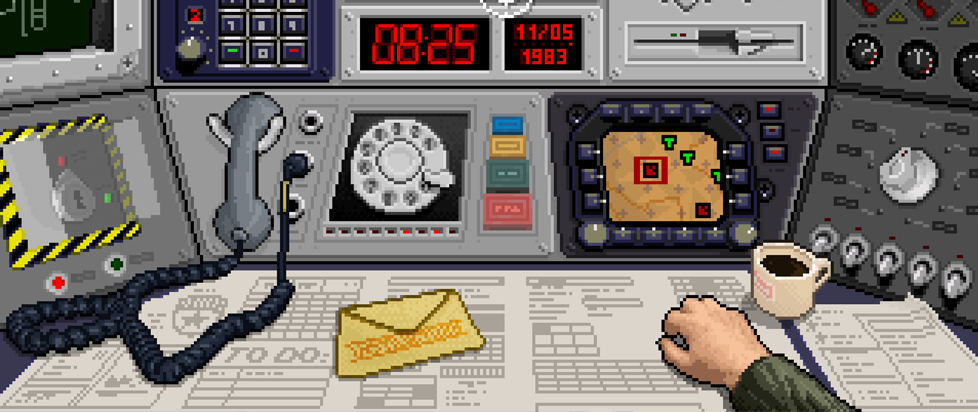
DEFCON
 This column is a reprint from Unwinnable Monthly #100. If you like what you see, grab the magazine for less than ten dollars, or subscribe and get all future magazines for half price.
This column is a reprint from Unwinnable Monthly #100. If you like what you see, grab the magazine for less than ten dollars, or subscribe and get all future magazines for half price.
———
Corey Milne stands at the intersection of gaming and world history to see what he can see.
———
On September 26, 1983, in a military bunker near Moscow, Soviet early warning satellites announced that the United States had launched an intercontinental ballistic missile. It would later flag up four more missiles in flight. On their way to deliver thermonuclear Armageddon to their enemies. Thanks to the common sense of the on duty officer at the time, lieutenant colonel Stanislav Petrov, it was recognized as a false alarm and the world didn’t end.
This is a well known false alarm concerning nuclear arsenals during the Cold War, but it’s only one of many such cases. Flocks of birds have been mistaken for bomber squadrons, bears have tripped silo perimeter alarms and even the goddamn orbit of the moon has been picked up as a first strike. These aren’t isolated Cold War affairs either. Several incidents have taken place in the period since. Frankly, it’s amazing that any of us are here at all.
I’ve seen a fair few nuclear-blasted landscapes in my time. Games love to nuke the inhabitants of their stories, tasking you to survive after society has inevitably broken down. Not too many focus on nuclear war as the kind of abstract concept we’ve pushed to the backs of our minds. We know that while these weapons exist, they can be used, but we don’t think about it because we have to get on with the time-consuming task of living.
ICBM, a game by Michael Davis examines that quiet, boring space between oblivion. The game is a joke of sorts. You take on the role of a US Air Force Missileer, one of those men and women who’s shifts involve sitting in a bunker and hoping an order to actually do something never comes.
Nothing happens in ICBM. No matter what difficulty setting you choose, you only have the rhythmic tapping of your fingers to keep you company. You can examine everything on screen, but you never interacted with anything, as you’ve not received an order to do so. You can’t even manipulate the cup on your desk, because even the coffee is stale. No orders come down in ICBM and the end of the world doesn’t never arrives. There are people doing this very job right now, hidden away in bunkers with their outdated IBM computer systems and fighting boredom. Existing within the possibility of damnation.

My favorite segment of Stories Untold, the interactive fiction anthology from developers No Code, is the third one. Based in an Arctic monitoring station, the story is drenched in a sense of isolation and fear ripped straight from John Carpenter’s The Thing. What makes this story work, though, isn’t the threat of some alien menace that’s coming to get you.
You flit from the different bits of equipment that adorn your workstation, engaged in all kinds of activities. You consult a codex so that you can tune into various frequencies, which then have you cross-referencing numerical grids or deciphering Morse code. There’s an air of confusion to all of this. The more you do, the more then tensions ratchets up. In your head, the stakes are growing higher, but the measure of them are obscured and hidden away. The shape of things to come is just shadows in a blizzard.
Part Three of Stories Untold is frenetic and it’s the polar opposite of ICBM’s routine contemplation. They’re two possibilities within the same space. From that seat in a small shack buffeted by a snowstorm, those bulky knobs and radio dials provide you with a direct connection to events happening far, far away. Somewhere at the coordinates your logging, something is happening. It’s big and it’s terrible. Sooner or later, it’ll be at your doorstep. You can almost swear you can hear the scream of rockets streaking through the air. For now, you need to keep feeding the system inputs. It’s the only thing you can do, but that’s okay. If feels good to be pushing buttons.
On January 13, 2018, an alert was issued, warning the residents of Hawaii that there was an incoming ballistic missile and it was bearing down on them. People sought shelter and luckily the attack never came. Perhaps now between shift changes in any number of nuclear silos, workers share a dry office joke about the newest in a long line of false alarms. Before carrying on as before. Doing what’s always been done. The missileers waiting at the end of the world.
———
Corey Milne is an Irish freelance writer who likes to poke at that strange intersection where games meet history. A roundup of his writing can be found at coreymilne.com. You can join his Rad-Lands motorcycle bandit gang on Twitter @Corey_Milne.




